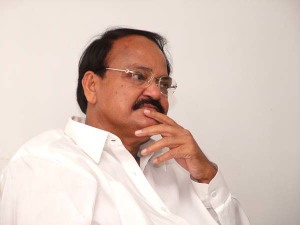The new minister for Information and Broadcasting!
Has called for development-oriented, responsible, media!
 Fine. But then the new minister is an experienced leader and he must be only too well aware how the Indian media sector is performing today.
Fine. But then the new minister is an experienced leader and he must be only too well aware how the Indian media sector is performing today.
It is all about surviving and performing for survival only. There is a sense of let-down and the media is functioning in an atmosphere of uncertainty, fear and hesitancy.
Where is the demand for development-oriented news and analysis of developments in various sectors of society, politics and economy? Simply the Indian media scene is one of unstated fears and helplessness. Already, we are witnessing the decline of print media in the developed West, some of the famous names and titles are closed down (Independent in UK and downsizing, The Times, London) and in the US too we see the Washington Post sold out to Amazon.
Of course the advent of Internet had changed the rules of the media game. Indian TV channels have boomed with much uncertain future of their own!
Already, the trend in India is clear. Some of the titles, weeklies, had gone and there is a shift in readership profile.
There is social media and the spread of smart phones would further change the reading habits.
All this we cite to show that the role of the ministry of Information and Broadcasting must also undergone change, rather radical change. Public Service Broadcasting Service must be, really, development-oriented.As for the largest segment of the population, namely, the farmers and rural India there must be reasons to listen to the DD. Now, it is near zero, the use for DD news and features and other development programmes.
The future is the mobile news platforms. The videos are more relevant today as anyone using his or her mobile phones can access any news and information or any other services and use the APs and other tools.
As far agri/rural print media it simply has no future at all!
The government must overhaul the DAVP, the government advertisements or subsidies have to be focused on f arming for there is still a vast scope for educating and training farmers in many new fields.
There are, in spite of the many challenges, great many opportunities to serve the farming sector. Once the farmers are targeted there are closely linked other sectors, villages, health, education and job opportunities besides a vast range of cultural and family-oriented programmes.
The Hon’ble minister might not have enough time on his hand, as he is a senior minister and whose time may be better utilised in other portfolios he is charged with. But the time has come to re-designate the ministry simply as ‘ministry of Media and TV’. Go for drawing up plans to convert the DD into a BBC type International news broad-casting institution.
See the AlZazeera!
A wonderful new international broadcasting institution from Quatar, the small desert country and yet with sufficient backing, it has almost become an alternative BBC for the Middle East and Arica!
There is a need for a new media policy for the new government. It looks the Modi government doesn’t have given enough thought to this front, that of creating a new brand for Indian media.
A democracy of the stature of India needs a new imprint on the media front.
Press Freedom, in our view, calls for a liberal democratic polity.
That means much openness, much press freedom and an atmosphere of debate and argument.
This tolerance only can also unleash the potential of the people, the common citizens. Mr.Ruchir Sharma, the author of the latest book, the rise and fall of nations, says so convincingly from his travels and observations of nations, big and small that out of the 124 countries he had studied the ones who reported 5 per cent growth rate, 64 are democracies and only 60 are dictatorships. The countries that are democracies with free market economies there is this further distinction that the good ‘billionaires come from technology and other innovative sectors. The ‘bad’ billionaires come from the old style industries where corruption is still thriving. And, as free press and press freedom thrives, there is this observation from the discerning Sharma.
He says that the newly elected leaders are more likely to be corruption free and he or she has to deliver within the first two or three years. When you see the other countries where the leaders ‘manage’ to cling on there is room for corruption.
Of course all these observations are common sense, we see here within India itself dynastic, undemocratic parties and governments do the very same findings.
Why we say all these things is the fact that democracy, parliament independent judiciary and of course free press all play their respective roles so that there is a non-exploitative society and economy are all possible.
Media, big, industry scale would be there and would play a government supporting role. But it is the small that is beautiful. Media is power and media power builds up public perception and public opinion. Ultimately, media power matters in a society.